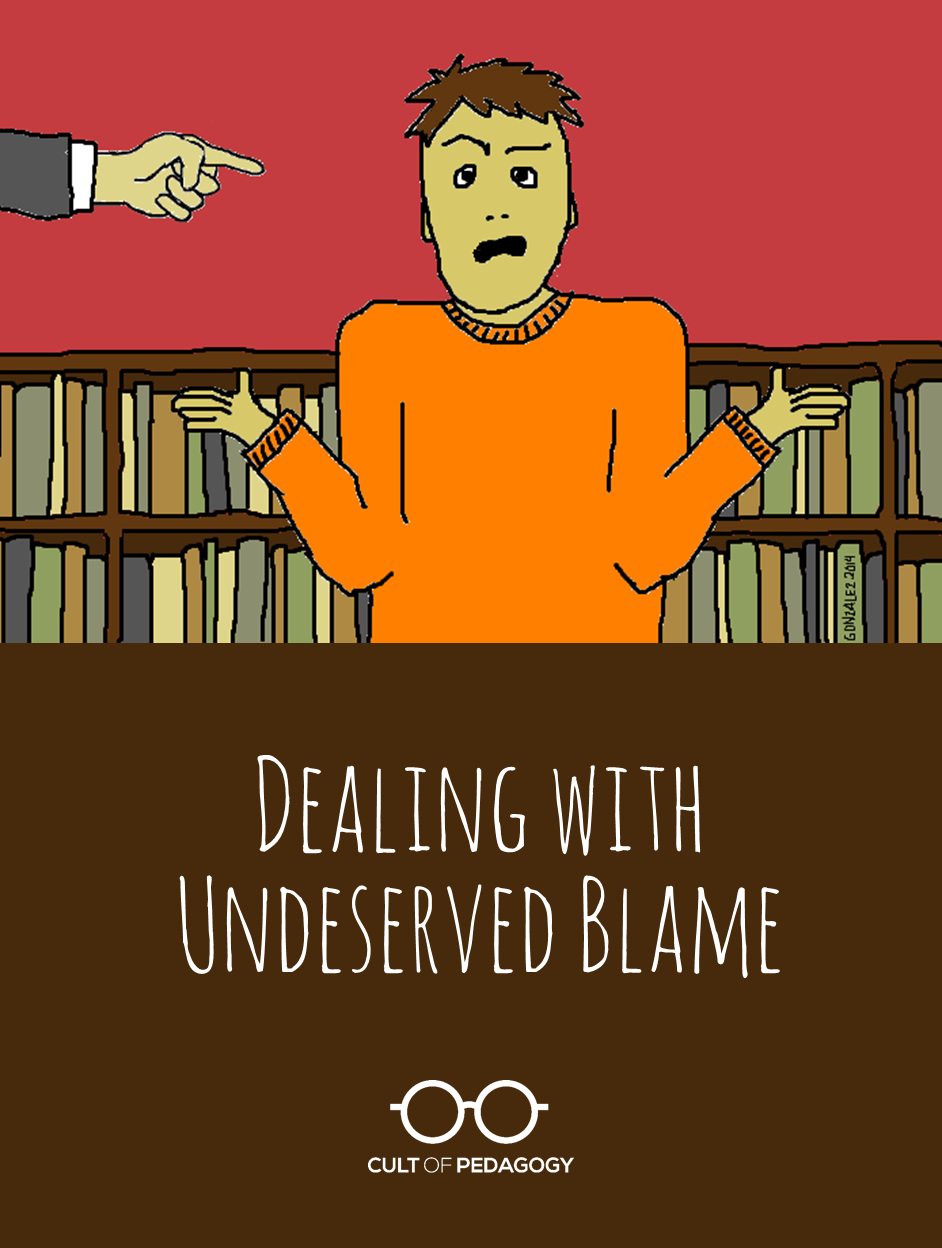
I once had a student draw all over his pants with a marker.
Wonder why? According to the nice note I received from the child’s parent after school, it was because my math instruction was not challenging enough. When faced with such crushing boredom, what else is a kid to do?
Moments where I am blamed for something I did not do take me to a dark place. They make me question my career choice, the moral fiber of our society, and my hope for the future. I fantasize about the scathing response I will righteously deliver to my foe’s inbox. And then I calm down and deal with it, in what I hope is an effective way.
Here’s what I’ve learned from being a scapegoat:
Take a little time to calm down, but not too much. Obviously, it’s important to cool off a little before doing something knee-jerk that will be counterproductive and get you in trouble. But it’s also important to go ahead and deal with it. There’s no need to drag it out and let it drag you down for any longer than necessary.
Try to remember that this is not really about you. Somebody is frustrated. They don’t know what to do. So they blame you.
Let your boss know. Go ahead and be proactive about letting your boss know there is a parent who is angry with you. Chances are, your boss will recognize that the claim is misguided and will offer some support. At the very least, they will know about it and won’t be blindsided if the issue makes it to them down the road. Your boss will already be in your corner instead of wondering why they’re spending their precious time cleaning up your mess. Also, you won’t waste mental energy being scared of whether or not your boss will find out and whether or not they will understand.
Remember customer service. Be polite so that you don’t escalate the situation. Use Todd Whitaker’s magic words to affirm that you hear and understand the concern. Say, “I’m sorry that happened.” (From his book Dealing With Difficult Parents, which is a great read for more thoughts on these types of issues.) Reassure the parent that you are willing to work together to address the issue. You are not Zappos, and are not obligated to do everything in your power to prove that the “customer is always right,” but when you are polite and acknowledge the other person’s concern, you demonstrate that you are willing to be a good partner in solving this problem.
Accurately rename the issue. In my pants-drawing escapade, the problem was that a parent was frustrated with a child’s decision to ruin a pair of pants. While my math instruction could improve in countless ways, ruining pants is not one of its faults, and was not really the problem. If you can only muster the courage to rename the issue in your own head, even that will help you realize that the issue is not a result of your own shortcomings. If you can navigate the delicate road to rename the issue for the parent (not an easy thing to do, especially if you are upset and frustrated yourself—tread lightly), then you have both mastered effective communication and helped someone solve a problem that actually exists.
If you’re putting your communication in writing, run it by a trusted colleague first. Always get a second opinion. It could be that you need someone to veto something that is bound to make your life miserable. Or it could be that you need someone to help you get the courage to stand up for yourself when appropriate.
This is a game where you must swallow your pride, but not sacrifice your dignity. If you can use the steps above, then hopefully, the situation will pass quickly and turn into an opportunity to do what we ultimately got into the teaching profession to do: help someone. ♦
Justin McCollum was a 3rd grade teacher at the time he wrote this post.
Join my mailing list and get weekly tips, tools, and inspiration—in quick, bite-sized packages—all geared toward making your teaching more effective and fun. You’ll get access to my members-only library of free downloadable resources, including my e-booklet, 20 Ways to Cut Your Grading Time in Half, which has helped thousands of teachers spend less time grading!





What do you do when you are blamed and targeted by your principal?
I was recently blamed for an action when I called home to share the days unfortunate events with the family (who I felt we had a good relationship and I share good news with). It caught me off guard. I owned where I dropped the ball, told them that I was feeling flustered but would research the matter more. Did I address this appropriately? What could have done to deal with the blame in the moment so it didn’t through me off the way it did?
Hi Paige,
It’s so hard to not take these kinds of things personally. Although rattled a bit by the family’s response, which I think is pretty normal, it sounds like you put into place some of the suggestions from the post. I’m thinking that offering to look into the incident again, is one way the family is being heard. That still doesn’t mean you are responsible for what happened or that the outcome will change, but it’s just always good practice to reflect and learn from these kind of sucky experiences. If you haven’t already, you might want to check out some of the resources that are in the post – having as many tools in your toolbox as you can is always a good thing. Hope this helps!
If a Principal is saying it means there is something we can improve upon … Sometimes parents directly talk or communicate to the Principal, now Principal can advice you to improvise the way of teaching or take the matter with utmost care.
Teachers are like lightning rods: the path of least resistance. Accept this, and you’re good to go. The person with the least amount of power is going to take the strike.
I always always always carbon copy my department head on emails to parents like this, and if the issue is big enough or the parent is known for causing trouble, I carbon copy my principal as well. I say right in the email who I’ve carbon copied so that the parent knows I trust those higher up than me to have my back on the issue. You’d be surprised how fast some people’s attitudes improve when they realize other people are paying attention and they won’t be able to spin the story later on.
liked the content. Would like to understand how to deal with people at work who backbite and are kind of jealous with your position, try to let you down always.
I’m not sure if these articles are specific to what you might be looking for, but take a look and see what you think: The Principal’s Pet: A Cautionary Tale and Find Your Marigold: The One Essential Rule for New Teachers (this is still great for all teachers).
We need to handle the parents and calm them down. Express positivity through your gestures. Give a patient hearing to what they want to say. Explain your view point in a convincing manner.
Amazing article. Very helpful to teachers.